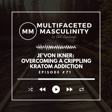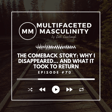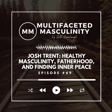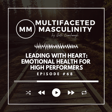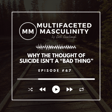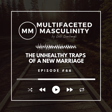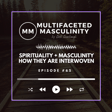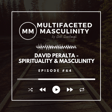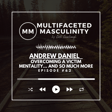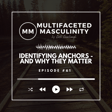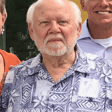
Dave Charlson - What is Healthy Masculine Vulnerability... and so much more. | Ep. #59
Today is special… because today you get to hear from the man who has helped me navigate life's challenges more so than any other man. The one and only David Charlson. He is the person I turn to when I feel stuck, overwhelmed, sad, or proud. He is my personal and business coach, as well as a dear friend.
I’m confident you’ll be able to grab some nuggets of wisdom from our conversation that can fundamentally improve the trajectory of your life if you’re willing to implement them.
Dave has over 24 years of business development experience. He was a mortgage banker for 16 years He has spent the past 10 years developing products for the pet industry and has created, branded, and established sales for two products that have generated 16 million in revenue He is currently CEO & President of North American Sales for Authentic Sales LLC, his pet product sales and marketing company that imports WAG dog treats from Australia and distributes them nationally in the US and Canada.
Dave is also CEO of Authentic Coaching Inc, a coaching company dedicated to helping leaders significantly increase performance and fulfillment through the power of Authentic Alignment. Dave is all about creating safe places for businesspeople to be vulnerable and real about their struggles and brokering the truth of heaven in exchange for their limiting beliefs and fears. He does this by attracting God's presence with his dedication to an extreme joy-filled vulnerability and boldly sharing radical testimonies. Dave also coaches a select group of executives across the United States.
David is happily married to his wife Michele and has 4 children ages 27, 21,19,& 17
In this episode you'll learn:
- What does healthy masculine vulnerability look like?
- In what ways does vulnerability impact relationships?
- Why do we fight so hard to hold on to unhealthy internal paradigms? (and how do we change them?)
- How to stay grounded when things feel chaotic or overwhelming.
- How to stay strong in your identity and open to other people's spirituality.
- In what ways do Christians use Christianity to avoid taking responsibility?
LINKS:
Host: Josh Cearbaugh
Website: https://joshcearbaugh.com
Instagram: https://instagram.com/joshcearbaugh
Linkedin: https://www.linkedin.com/in/joshcearbaugh/
Online Course: https://www.jumpstartyourlife.com
Guest: Dave Charlson
Website: https://davidcharlsoncoaching.com/
Conversation about Shame: https://vimeo.com/198274840
